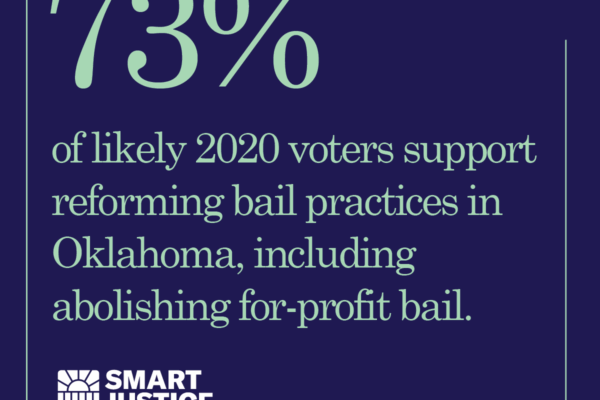What money bail is supposed to be:
Money bail is supposed to be used as a mechanism to ensure someone’s reappearance in court.
If that were the case, bail would be individually assessed so that, when there is reasonable concern someone may fail to appear, the bail is set at an amount that is enough money someone could pay out of pocket, but would also show up in order to get their money back.
What money bail in Oklahoma looks like in practice:
On any given day, 70% of people in county jails in Oklahoma are there pre-trial. People can end up waiting days or weeks, dependent on county, before an initial appearance. They are not granted an attorney as an advocate in bail hearings.
Money bail is set in almost every case, and oftentimes based on the charge, not on someone’s ability to pay. People who are wealthy can buy their freedom.
Some people can scrape together enough money to pay a bail bondsman a nonrefundable fee for their release.
Every day in jail while people wait, the outcomes for them are worse--families and communities pay the price for an inefficient system. Bail oftentimes becomes a de-facto detention mechanism, and that pre-trial detention is then used as leverage to force folks to plea out their case.
Our vision for the pretrial system and money bail:
Wealth does not determine freedom from incarceration; families remain together, not torn apart or indebted simply due to an arrest.
People are assumed innocent until proven guilty; conditions of release are limited; and pretrial detention is exceedingly rare and is not the result of an inability to pay bail. .
The criminal justice systems respect the dignity and equality of all people.
Everyone deserves to an equal chance at freedom and justice.
- Communities are safer and healthier when they are whole. Money bail tears them apart by keeping people in jail for weeks or months at a time, while they are assumed innocent, before they’ve ever had their day in court. During that time people often lose their jobs, their housing, and their children.
- Basing people’s freedom on their wealth – not flight or public safety risk – denies people equal access to justice and does not make us any safer.
- Unable to afford money bail, many people stay in jail for weeks, months, and sometimes years while their case moves forward, or plead guilty to a crime they may not have committed.
- Some people pool their resources to pay a for-profit bail bonds company a non-refundable 10% fee based on their total bail amount, a fee they don’t get back even if their case is dismissed or they are found innocent.
Every year, Oklahoma’s money bail system keeps thousands of people in jail before they get their day in court – all because they can’t afford to post bail and buy their freedom.
- Oklahoma needs to stop wasting time and resources on this unfair and ineffective system that is harming our communities – particularly low-income people, indigenous communities, and communities of color.
- In Oklahoma, over 70% of people in jail are awaiting trial or sentencing, costing Oklahoma taxpayers millions a year.
Detaining people while their cases move forward can have significant and long-lasting impacts on the outcome of people’s cases, as well as their health, wellbeing, and economic security.
- Even just a few days in jail can cost someone his or her car, job, housing, or child custody.
- Because Black, Latinx, and Indigenous people are more likely than white people to be stuck in jail while their case moves forward, money bail fuels already egregious racial disparities in the justice system.
- Research shows that jailing people while their case moves forward puts them at higher risk of being convicted, taking a plea deal, and receiving harsher sentences.
- Research also shows that Black people are assigned higher bail amounts than white people accused of similar offenses. Specifically, bail bond amounts for Black men are 35% higher than bond amounts for white men. For Latino men, they’re 19% higher than for white men.
- Each year, roughly 1,000 people die nationwide while locked up in local jails. The majority of these deaths are among people who have not yet been convicted of a crime and are awaiting trial.
Oklahoma can and must adopt proven alternatives to truly promote the economic security, wellbeing, and safety of our communities. Senate Bill 252 will:
- Help make sure people aren’t locked up simply because they are unable to pay to get out of jail while their cases to move forward.
- Shift away from a system where your freedom depends on your bank account balance, to one with individualized determinations of ability to pay.
- Require that in one of their most vulnerable moments on their worst days, folks have access to counsel to advocate for them at a bail hearing.
- Require that Oklahoma move towards the constitutional floor and update our statute so that people must be seen for an initial appearance within 48 hours, setting a standard for justice, regardless on what county you live in.
- These reforms build upon common sense solutions adopted in other localities that have significantly reduced their use of commercial bail, such as Kentucky, New Jersey, and California.

